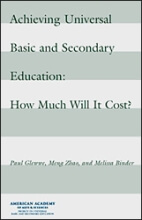Achieving Universal and Basic Secondary Education: How Much Will It Cost?

What would it cost to provide every child in the world with a high-quality primary and secondary education? As part of the American Academy’s Universal Basic and Secondary Education (UBASE) Project, economists Melissa Binder, Paul Glewwe, and Meng Zhao tackled this important question. Glewwe and Zhao review World Bank, UNICEF, and UNESCO estimates of the annual costs of achieving universal primary enrollment by 2015. These estimates focus on the cost of increasing the number of places for students in schools and the number of teachers. However, the availability of school spaces is not always the limiting factor in school attendance rates. As Glewwe and Zhao explain, the true cost of universal education will include the costs beyond those associated with school construction and expansion. Although calls for secondary education have been increasing, few studies of what it will take to achieve universal secondary education have been undertaken. Binder offers a pioneering estimate of the cost of providing enough secondary school spaces for all children of secondary school age. Her work is an important foundation upon which efforts to understand the challenge of keeping all students in school through age 16 will entail.
Contributors
Melissa Binder is an associate professor in the Department of Economics at the University of New Mexico, where she teaches courses on labor economics and Latin American development. Much of her research concerns education decisions in the United States and Mexico. She has also written on the relationship between education and the motherhood wage gap in the United States.
Paul Glewwe is an associate professor in the Department of Applied Economics at the University of Minnesota, where he teaches courses on econometrics, the microeconomics of economic development, and demand theory. His research focuses almost exclusively on developing countries and includes the following topics: education, child health, inequality and poverty, and the design of household surveys. Previously he was a senior economist in the Development Research Group at the World Bank. He has worked in and conducted research on many countries in Africa, Asia, Latin America, and the Middle East.
Meng Zhao is a Ph.D. student in the Department of Applied Economics at the University of Minnesota. Her research focuses on development economics with special interest in education, health, and agriculture in China. She has also worked as a consultant for the World Bank, analyzing longitudinal survey data collected in rural China and cross-country data on education in Africa.